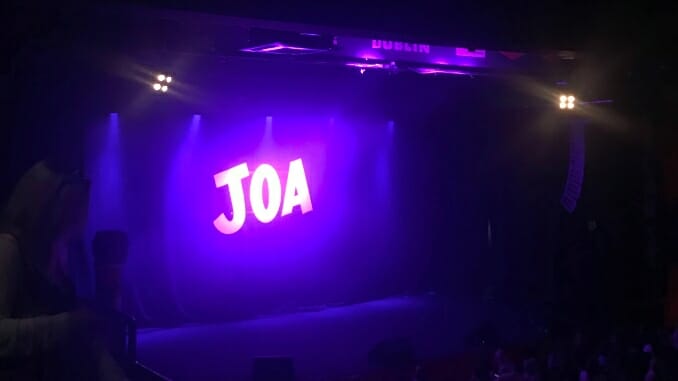
Last night I attended a comedy show that also doubled as the most concentrated gathering of straight cis women in Dublin. Comedian Joanne McNally attracts a very particular crowd: girlos, an Irish-specific brand of basic (think lots of fake tan and Instagram posts about brunch). There were, of course, some interlopers like me (I am neither straight nor Irish) at her show The Prosecco Express, but I still tried to cosplay as a girlo to embrace the night ahead. By time the show ended, the line for the women’s toilets were so long that some took to using the (admittedly sparsely attended) men’s restrooms. Word has it that at another Irish gig of McNally’s, the venue ran out of prosecco and gin, forcing staff members to run to a wholesaler to satiate the crowd.
“Lahhhbia,” McNally drawled in her posh southside Dublin accent when she arrived on stage, assessing the audience of predominately cis women. “Labia, labia, labia.”
When she spotted a man in one of the front rows, she turned to the Irish Sign Language interpreter next to her. “What’s the sign for ‘security breach’?”
Though partly based in London, McNally is a distinctly Irish performer. She declared us essentially a female IRA lobby (and jokingly proposed merch saying “Tiocfaidh ár labia,” a play on the IRA phrase “Tiocfaidh ár lá,” meaning “Our day will come,” referring to the reunification of Northern Ireland and the Republic of Ireland) and acknowledged that her appeal on a global scale is limited. Even in the UK, a country close to Ireland both geographically and culturally, there are distinct gaps that any Irish person would notice. In McNally’s set, that includes both British guys’ propensity for eye contact during sex and Brits’ lack of knowledge about First Holy Communions.
There’s something to be said for localized comedy, though. The crowd in Vicar Street, where McNally is performing for an impressive 50 shows, couldn’t stop laughing. The woman standing behind me kept echoing the end of McNally’s jokes with breathless incredulity. On a surface level, some of these could be written off as recognition laughs. People are just happy to hear cultural references they’re familiar with, and that aren’t necessarily catered to in stand-up specials on Netflix or Amazon Prime.
But there’s more to it than that. McNally is undoubtedly a talented performer, delivering punchlines with gusto and bantering easily with audience members. And whatever she says about having limited appeal abroad, she’s broken into the UK comedy scene. Some of her upcoming gigs in Edinburgh, Brighton, London, and in other cities have already sold out.
Here in Ireland, though, McNally’s set speaks directly to Irish women’s experiences—not all of them of course, but a sizable number of them, ready to drink white wine (or “bitch diesel” as she calls it) and laugh at their shared struggles. In a country where abortion was illegal until 2018 and the misogynistic influence of the Catholic Church still lingers like a persistent fungus, McNally’s barbed comedy serves as a form of much-needed catharsis. Despite coming from a position of privilege (the seaside Dublin neighborhood McNally hails from is also home to Enya, Bono, and the Edge), her comedy proves relatable, whether she’s talking about the fear that accompanies first dates or the nation’s housing crisis.
I happened upon something I didn’t expect at The Prosecco Express: a sense of belonging. As an American who moved to Ireland just under a decade ago, relating to the experiences McNally described and understanding the cultural touchstones made me feel closer to my adopted home. These weren’t just laughs of recognition, but of kinship. One of my friends tagged me in her Instagram story of the Vicar Street stage after the show with the caption “Tell me you’re an Irish woman in your late 20s without telling me.” I feel like a sap saying it, but that Instagram story made my heart swell with happiness. Maybe I need to change that first paragraph; I’m not quite the interloper anymore.
While globally released stand-up specials may be the ultimate goal for many a comedian, resonating with an audience close to home is also a worthwhile pursuit. Take the time to find the comedian who caters to your city or region or country. There’s something extra special about laughs that affirm your place within a community.
i>Clare Martin is a cemetery enthusiast and Paste’s assistant comedy editor. Go harass her on Twitter @theclaremartin.